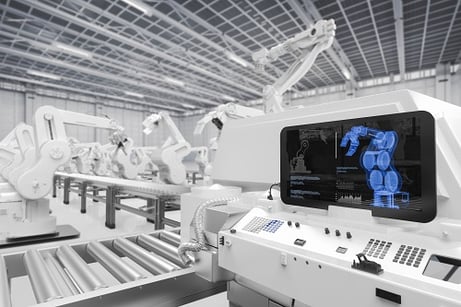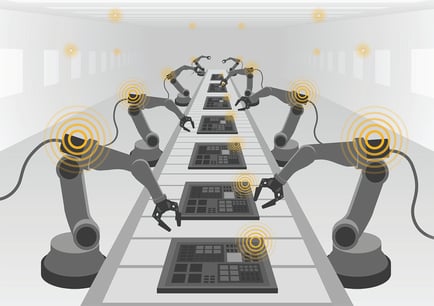August 19, 2021
The convergence of the internet of things (IoT), artificial intelligence (AI), Bluetooth Low Energy (BLE) and other communication protocols, and more on-device intelligence has led to smaller and smarter devices. Not only are these devices less reliant on the cloud or the internet, but they also offer tremendous benefits to industrial use cases through automation.

Thanks to industrial IoT (IIoT) technologies, we can now install interconnected sensors, trackers, and various monitoring devices on industrial equipment for preventive maintenance. These devices collect data and send it to the manufacturing company’s systems, allowing employees to remotely monitor these machines for safety, security, and operations to improve productivity and efficiency if needed.
With IIoT becoming an integral part of manufacturing systems and production processes, it is bound to play a significant role in shaping the future of industrial automation. Here are some of the major benefits we can expect soon:
IIoT technologies enable industrial units to equip all machinery with tracking devices to monitor and report any irregularities or malfunctions. We can also install IoT-enabled sensors to regulate air quality, humidity, and temperature.

These measures ensure product quality and increase on-site safety for employees with robotics and various IIoT applications. For example, devices can send alerts with precise locations when detecting any change out of the pre-determined range. Any deviation or error can be noticed and corrected in a timely manner, which reduces production downtime.
A device with IIoT capabilities can even suggest additional changes to equipment settings based on the data analyzed and evaluated over time. The benefit is an increase in productivity, safety, and security, all while reducing operating cost.
IIoT creates a connected network of sensors, monitors, and trackers to optimize the working environment and production output. Imagine having every piece of equipment and every wall, ceiling, and floor of the factory equipped with “always-listening” sensors that detect the earliest signs of a production problem.
For example, if a machine starts to rattle in a strange and unexpected way, it will trigger a maintenance robot to come to perform an inspection. The maintenance robot will generate repair orders based on its discoveries and fix the issue before a “line down” situation happens.
The automation capabilities enabled by IIoT allow manufacturing facilities to operate smoothly and address problems without human intervention. Because the maintenance process can be automated, businesses can save and prevent enormous costs as they reduce line-down issues that disrupt production.
With machines and devices that can operate autonomously, there will be less risk for human error. Industrial IoT technology will reduce the number of human-to-human, or human-to-computer interactions. This helps not only to reduce personnel costs, but also improve various manufacturing processes.

More automation also helps eliminate the potential for miscommunication, both from human to human, and from human to machine. It will be possible to automate the collection of data, and analyze the data collected across all areas of operations, to make informed decisions and implement more effective strategies. Not to mention, we can break down organizational, systemic, process, and data silos.
Artificial intelligence (AI) and machine learning (ML) won’t fully substitute for human involvement any time soon, but it promises tremendous benefits that will bring about a cleaner, greener, safer, and more sustainable environment. Enterprises that can take advantage of a deeper and smarter analysis of their data will reap significant operational dividends.
Industrial IoT and factory automation form the building blocks of intelligent factories, and smart metering systems must be reliable when it comes to battery life. Since these devices perform computing operations at the edge, they need to ensure their processors can perform these tasks on a low electrical charge.
Ambiq’s ultra-low-power wireless MCUs and SoCs are at the core of millions of connected sensors that enable critical IIoT technologies in key industrial sectors. Built on our patented Subthreshold Power Optimized Technology (SPOT) platform, Ambiq’s products reduce the total system power consumption on the order of nanoamps for all battery-powered endpoint devices.
Simply put, Ambiq's solutions enable endpoint intelligence everywhere.
Back